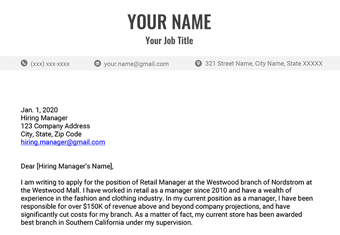We’re already well into 2020, and nearly all job applications are submitted online through hiring and recruiting software. Almost every part of the process is fast, automated, and to the point.
Are cover letters even necessary anymore? Do you really need one?
While the answer is not readily apparent, our team of experienced hiring managers and HR professionals has teamed up to provide you with thoughtful, comprehensive insights that will hopefully help you navigate these questions.
Is a Cover Letter Necessary?
A cover letter is necessary if:
|
In most other situations, cover letters are only really needed in the event that you want to provide context or explain something that your well-written resume doesn’t.

Cover Letter: Optional
Sometimes, employers place a “Cover letter (optional),” description over a document upload field on a job application. This can be daunting for some people, as it’s hard to know what to do – attach a cover letter or not.
Should you include a cover letter even if it’s not technically required? Will it improve your chances of getting hired?
While including a cover letter may indeed be optional, in situations like these, most people do include one alongside their applications, so hiring managers tend to expect to receive cover letters from applicants.
Additionally, there’s often a disconnect between what is required by recruiting or hiring software, and what the hiring manager actually wants. This is because hiring managers are busy doing their own jobs, while HR professionals and recruiters are the ones who are tasked with setting up the application and recruitment software.
With these things considered, when cover letters are listed as optional, it’s always best to include one with your application.
When to Include a Cover Letter
It’s almost always a good idea to send a cover letter alongside your resume and application.

While your resume will provide the hard data behind your candidacy for employment, your cover letter will provide the employer with deeper insight into why hiring you would be the best decision for them, and will also give you the chance to distinguish your application from those of other candidates. It’s also an opportunity to mention or explain anything that is not clearly expressed on your resume.
Cover letters should not be viewed as a burden or a chore, but rather, an opportunity to further express your interest in the role, as well as put forth a case for why the hiring manager should take a chance on hiring you.
Additionally, most hiring managers expect to receive a cover letter along with an applicant’s resume. Even if a cover letter was not requested, you should consider sending one anyway, as you will at worst be viewed as a motivated individual and a go-getter.
TL;DR: Unless specifically instructed not do so, include a cover letter with your application.
When to Not Include a Cover Letter
There are really only three scenarios in which not including a cover letter with your application is preferable:
|
Most job applications these days are submitted online. Sometimes on these online recruitment platforms, there is nowhere to attach a cover letter – there’s only a field for your resume. When this is the case, there’s no need to force it – just skip the cover letter.
It may go without saying, but you also don’t have to worry about writing a cover letter when the employer or recruiter specifically tells you not to include one.
And finally, not having a cover letter is still preferable to including bad one. Your cover letter is meant to be an introduction to you and what you will bring to the company if you are hired. A poorly-written cover letter does not paint a great picture of your potential impact on the business.
If you’re in a rush and have no way to write a great cover letter, it’s best to leave it out.
TL;DR: Unless you’re told not to, or you can’t provide a good one, include a cover letter.
How Important Are Cover Letters?

Even if only 25% of hiring managers look at and place emphasis on cover letters, that’s still at least one out of every four positions you apply for – and that’s if only one hiring manager views your application. At many companies, an HR professional will also view your application and resume, as will a handful of hiring managers and other stake holders.
This is why a cover letter is important for your application – someone will see it, and you’ll have that opportunity to impress your potential employer.
Additionally, a cover letter will be important in the event that you need to explain gaps or oddities on your resume, or if you’re applying for an entry-level position.
TL;DR: Cover letters are important.
Do I Need a Cover Letter?
Unless you are told not to provide one, or there is no way to do so, then you need a cover letter.
It’s a simple numbers game really: although some employers may not care a lot about cover letters, many do, and those are the ones you should be trying to impress with yours.
Remember, unless asked specifically not to provide a cover letter, you’ll never be hurting your chances of landing employment by including a great cover letter with your application.
TL;DR: Yes, you need a cover letter.
Additional Resources
- How to Write a Cover Letter
- Cover Letter Templates
- Cover Letter Examples
- Cover Letter Format
- How Long Should a Cover Letter Be
If you’re having trouble writing the perfect cover letter, let us help you craft one that will get you your dream job with our intuitive cover letter builder.







